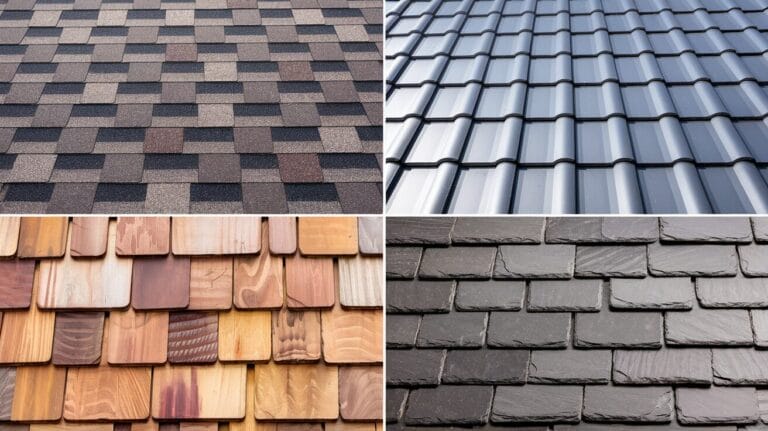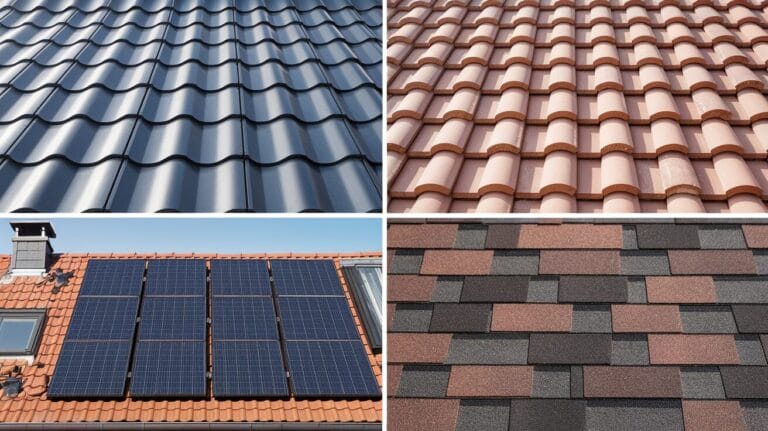
Asphalt shingles are roofing materials that consist of a mat or base layer, commonly made of fiberglass or organic materials, which is coated with asphalt and then covered with mineral granules on the exposed side.
This construction gives the shingles their distinct appearance and provides them with the necessary strength and durability to withstand various weather conditions.
Composition and construction of asphalt shingles
The composition of asphalt shingles consists of several layers. The base layer is typically made of fiberglass or organic materials, such as cellulose fiber or recycled paper. This layer provides structural support and stability to the shingles. On top of the base layer, asphalt is applied, which acts as a waterproofing agent and gives the shingles their weather-resistant properties.
Finally, mineral granules are embedded into the asphalt surface to add color, texture, and UV protection to the shingles. These granules also contribute to the fire resistance of asphalt shingles. The construction of asphalt shingles ensures that they are lightweight, flexible, and easy to handle during installation.
What are the different types of asphalt shingles?
There are three main types of asphalt shingles: 3-tab shingles, architectural shingles (also known as dimensional or laminate shingles), and luxury shingles.
3-tab shingles are the most basic and budget-friendly option. They have a flat, uniform appearance and are composed of three tabs that are equally spaced along the length of the shingle.
Architectural shingles are thicker and more durable than 3-tab shingles. They have a textured, multi-dimensional appearance that can mimic the look of other roofing materials, such as slate or wood. Architectural shingles are available in a wide range of colors and styles, making them a popular choice for homeowners seeking a more aesthetic appeal.
Luxury shingles are the highest quality asphalt shingles available. They are typically heavier and have a more intricate design and texture compared to other types of shingles. Luxury shingles often incorporate additional features, such as enhanced wind resistance, impact resistance, and extended warranties.
What are the benefits of using asphalt shingles?
There are several benefits to using asphalt shingles as a roofing material:
- Affordability: Asphalt shingles are one of the most cost-effective roofing options available, making them a popular choice for homeowners on a budget.
- Durability: Asphalt shingles are designed to withstand various weather conditions, including rain, wind, hail, and even fire. They offer excellent protection for your home.
- Easy Installation: Asphalt shingles are relatively easy to install, and they require minimal maintenance throughout their lifespan.
- Wide Variety: Asphalt shingles are available in a wide range of colors, styles, and designs, allowing homeowners to customize their roof to match their aesthetic preferences.
What is the cost of asphalt shingles?
The cost of asphalt shingles can vary depending on the type and quality of the shingles, as well as the size and complexity of the roof. On average, homeowners can expect to pay between $1.50 and $4.00 per square foot for asphalt shingles, including installation.
How to install asphalt shingles?
Installing asphalt shingles requires some basic knowledge and skills in roofing. Here are the general steps involved in the installation process:
- Prepare the roof surface by removing any existing shingles, repairing any damage, and installing a moisture barrier.
- Install the starter strip along the eaves of the roof to provide a secure base for the shingles.
- Begin laying the shingles, starting from the bottom edge of the roof and working your way up. Each shingle should overlap the one below it to ensure proper water drainage.
- Secure the shingles in place using roofing nails or staples, following the manufacturer’s instructions.
- Repeat the process until the entire roof is covered with shingles.
- Install ridge vents and ridge caps to provide ventilation and protect against leaks at the roof peaks.
- Inspect the roof for any remaining gaps or loose shingles, and make any necessary repairs.
How long do asphalt shingles last?
The lifespan of asphalt shingles can vary depending on various factors, such as the quality of the shingles, climate conditions, and maintenance. On average, asphalt shingles can last between 15 to 30 years. However, some high-quality shingles with proper maintenance can last even longer.
Comparison of asphalt shingles with other roofing materials
When comparing asphalt shingles to other roofing materials, it’s important to consider factors such as cost, durability, and aesthetics. Here’s a brief comparison:
| Roofing Material | Pros | Cons |
|---|---|---|
| Asphalt Shingles | Affordable, easy installation, wide variety of styles and colors | Shorter lifespan, may be prone to storm damage, environmental impact |
| Metal | Durable, long lifespan, energy-efficient | Higher cost, more complex installation, may dent or scratch |
| Tiles (such as clay or concrete) | Durable, long lifespan, fire-resistant | Higher cost, heavy weight, may require additional structural support |
| Slate | Highly durable, long lifespan, aesthetically pleasing | Very expensive, requires specialized installation, heavy weight |
Environmental impact of asphalt shingles
The production and disposal of asphalt shingles can have negative environmental effects. Asphalt shingles are typically not recyclable and can contribute to landfill waste. Furthermore, the production process involves the use of fossil fuels and the release of greenhouse gasses.
However, efforts are being made to improve the sustainability of asphalt shingles, such as the development of recycling programs and the use of more eco-friendly materials.



